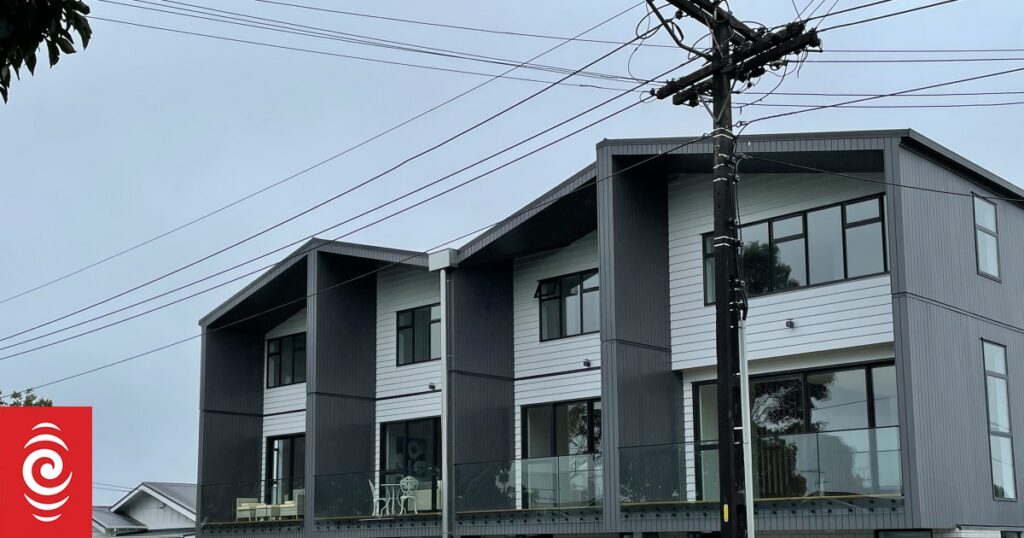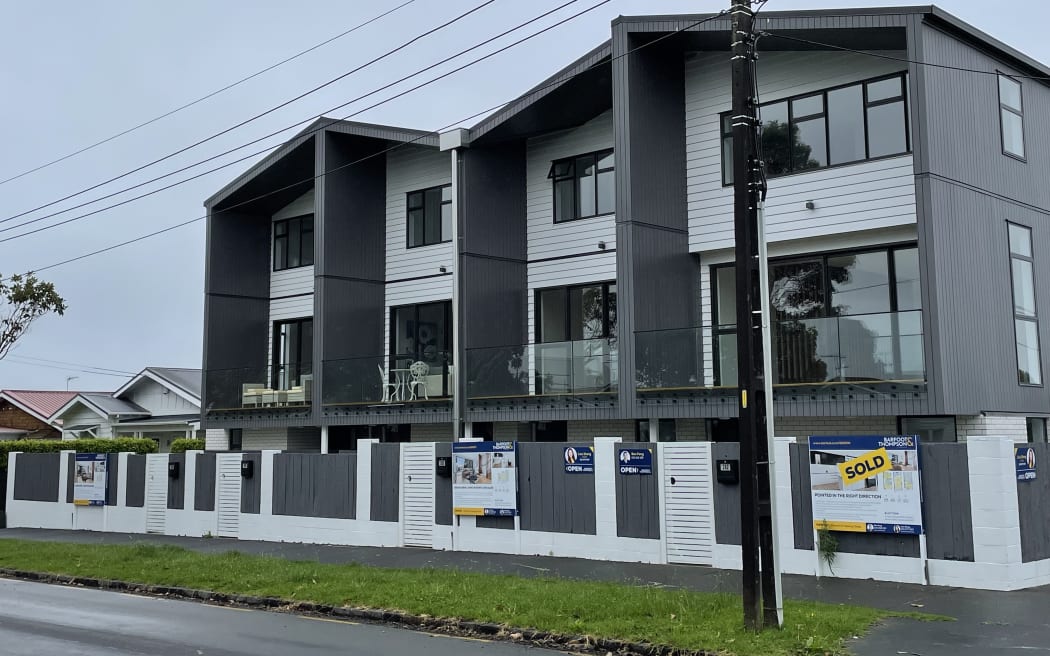The share of properties being resold for a gain is still reasonably high at more than nine in 10, with resale profits returning about $300,000 over the past year.
Photo: Bill McKay
Analysis – The housing market and interest rates continue to increasingly favour buyers with a rising number of listings taking pricing power out of the hands of sellers.
The RBNZ reviews the OCR next week, with expectations it will be held at 5.5 percent in commentary and forecasts similar to the past two statements issued this year.
Property resale profits have dipped again as the market shifts in buyers’ favour.
CoreLogic’s latest Pain & Gain report shows the proportion of properties resold for more than the original purchase price fell slightly to 92.9 percent through the first quarter of 2024, compared to the previous quarter’s 93.5 percent.
The share of properties being resold for a gain is still reasonably high at more than nine in 10, with resale profits returning about $300,000 over the past year.
“Anybody who’s owned for the typical seven to eight years will almost inevitably sell for a gross profit,” CoreLogic chief property economist Kelvin Davidson said.
However, the gain did not always result in a cash windfall for sellers, unless they were owner-occupiers downsizing, or investors selling out.
Going rate
North Island homes realised the largest gains and sales in the main centres were mixed, Davidson said.
But there still might be a lull for vendors with unsold properties over winter.
The QV House Price Index for April shows the national average value was flat with a 0.1 percent rise to $926,772 in the three months to the end of April 2024.
The national average value is now 2.7 percent higher than at the same time last year, but still 12.9 percent ($136,993) below the market’s peak in late 2021.
The Real Estate Institute house price index fell nearly 0.8 percent last month over March, but rose 2.8 percent on the year earlier.
Buyers were being cautious with the likelihood of interest rates staying at elevated levels for a while, and more talk of job losses, REINZ chief executive Jen Baird said.
The median number of days to sell fell three days to 43, compared with 2023.
The national median sale price increased by 1.3 percent year-on-year to $790,000 from $780,000, but fell 1.3 percent over the month before to $790,000 from $800,000 in March.
In the regions
Cities are losing momentum with Auckland’s three-month rolling average negative for the third straight month, according to QV.
The Super City’s average home value decreased by 0.7 percent to $1,281,996 this quarter. It follows reductions in February (0.4 percent), March (0.2 percent) and April (0.1 percent).
Tauranga (0.2 percent) Hamilton (0.0 percent), Wellington (0.6 percent), Palmerston North (-0.1 percent), New Plymouth (0.7 percent) Napier (-0.2 percent), Nelson (0.8 percent) and Christchurch (0.2) recorded flat or negative growth rates in average home values.
The data reflected residential property values continuing to slowly rise in Invercargill (3.2 percent), Rotorua (3.6 percent), Dunedin (2.1 percent), Queenstown Lakes (1.1 percent) and Marlborough (1.1 percent).
Read more: The Block NZ 2024 axed, houses to be sold by Warner Bros Discovery
Sellers would have to either readjust their price expectations or move to the sidelines, QV operations manager James Wilson said.
“Although getting finance and being in a position to service a mortgage in this economic environment certainly isn’t easy, buyers now control the narrative in most areas. They have time on their side and plenty of options to choose from,” Wilson said.
“We haven’t seen large numbers of investors re-enter the market following the recent reintroduction of 80 percent interest deductibility for landlords, and the looming introduction of debt-to-income restrictions will almost certainly hamper their ability to purchase existing property when it eventually happens.”
Banks drop interest rates
ASB has cut some of its lending rates for the second time in a week.
The three-year term will fall 26 basis points from 6.65 percent to 6.39 percent, with the four-year rate falling 10 points from 6.49 percent to 6.39 percent.
Falling wholesale interest rates had allowed it to reduce its retail rates for the eighth time this year, ASB executive general manager Personal Banking Adam Boyd said.
A few weeks ago the small SBS bank stole a march on the market dropping its three year rate to 5.99 percent, and last week Westpac beat the rest of the big banks dropping to 6.39 percent.
BNZ cut its six-month and one-year terms by between 5 and 10 basis points. They stand at 7.24 percent for six months, and 7.14 percent for one year.
Kiwibank’s special one-year rate is falling by about a quarter of a percentage point to 6.99 percent, while the standard one-year rate has fallen to 7.99 percent.
Inflation and the RBNZ
Measures to pull in inflation don’t need to be pursued to the bitter end before cutting interest rates to give households some relief, Westpac has said of Reserve Banks controls.
Westpac chief economist Kelly Eckhold said stubborn inflation and the RBNZ’s determination to control it would be the key issues confronting households in the rest of 2024, which would be an “uncomfortable” time.
Business and finance leaders are picking inflation to fall back into the Reserve Bank’s (RBNZ) target band in the coming year, with expectations that the central bank may cut interest rates by the end of this year.
A quarterly survey of a handful of forecasters and company heads – commissioned by the RBNZ – showed expectations were for inflation to slow from 3.22 percent to 2.73 percent in the next 12 months, the lowest pick since September 2021.
Growing debt has seen the number of whānau turning to financial mentors for help jump 40 percent, a new report shows.
Debt to banks and telecommunications companies increased, with people owing banks $311 million in 2023, up from $250m the year prior.
Fast-track laws could accelerate risky development
Proposed fast-track laws could lead to risky developments in natural hazard zones, endangering people and property, warn insurers, local authorities, and river engineers.
The Insurance Council and a Hawke’s Bay government committee, still affected by Cyclone Gabrielle, argue that the Fast-Track Approvals Bill does not adequately prevent building on land vulnerable to climate change.
The bill would streamline approvals, bypassing multiple existing regulations.
Social housing
A $20m-plus community housing project under way in Kaikohe is believed to be the biggest community housing project in the Far North, and the first in the country to be co-built and co-owned by an iwi and council organisation.
It will have 60 units of one, two and three bedrooms.
Meanwhile, Kāinga Ora has stopped plans to build nearly 1300 homes while it awaits the outcome of a government review and the Budget.
Official Information Act documents showed if all the developments linked to KiwiBuild that were paused went ahead, they would result in 1283 homes. Those included 690 KiwiBuild homes and 593 market homes.
>>> Read full article>>>
Copyright for syndicated content belongs to the linked Source : RNZ – https://www.rnz.co.nz/news/on-the-inside/517055/buyers-control-narrative-mortgage-rates-drop-what-is-happening-with-the-nz-housing-market-this-week

